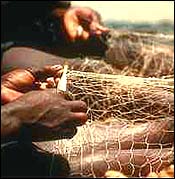Easter is on the horizon, so for the next three weeks, we’re going to follow water-stories that revolve around Jesus. Today, Jesus takes the plunge.
Ah, the amazing wonder of water! Many religions practice ritual washing. Hindus plunge into the Ganges. Shinto worshippers in Japan seek cleansing under waterfalls, orthodox Jews use a mikvah to represent a flowing stream.
Baptism is an act of abandoning yourself to the water and embracing the purity, healing and renewal the water represents. It calls for courage and resolve. It says, ‘forget decorum, to hell with face-saving, a new life beckons, it’s time to answer the call’.
800 years before John the Baptist, the Syrian general
Naaman, who had a dire skin disease, came to Israel looking for help. The prophet Elisha told him to wash seven times in the Jordan River and he would be healed. At first Naaman was offended - the Jordan was a mediocre river, quite inferior to the rivers of his homeland. But in the end he humbled himself, plunged in, and the God of Israel healed him.














